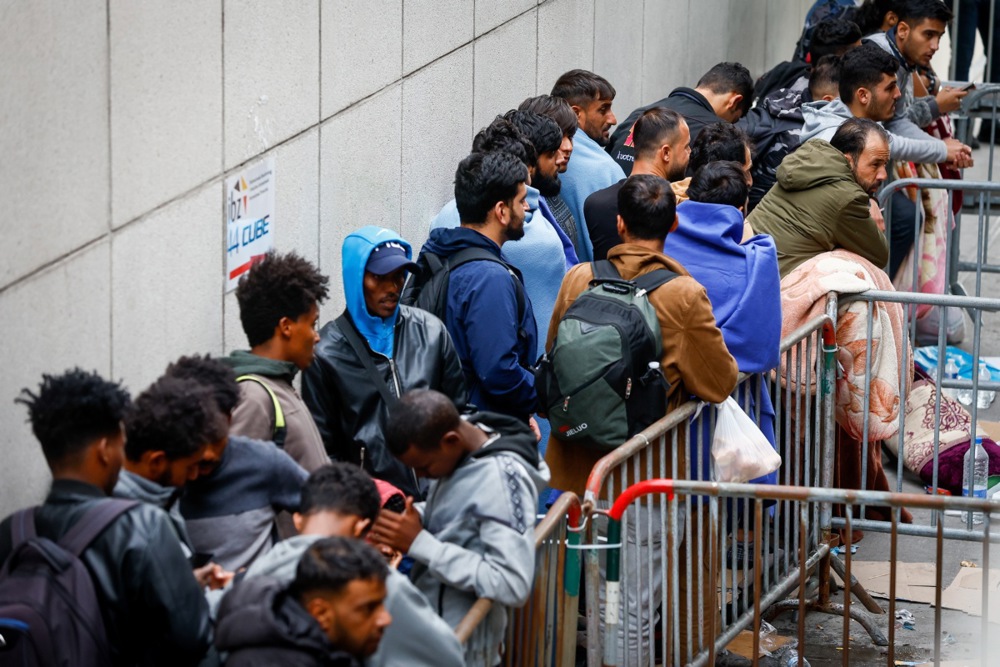In two landmark decisions, the European Court of Justice (ECJ) has significantly restricted how European Union member states manage asylum claims, delivering a setback to more restrictive migration policies.
Together, these rulings expanded protections for migrants and align closely with the positions of open-border advocates and human rights organisations.
First, the ECJ ruled on August 1 that no country may be designated a “safe country of origin” unless the entire population could be deemed safe — directly challenging national lists used to fast-track rejections.
The court stated that, under current EU law, a country cannot be designated as “safe” if it failed to meet protection standards for certain groups within its population.
A forthcoming regulation, set to apply from June 12, 2026, will allow exceptions for clearly defined categories of persons.
The latest judgment placed clear constraints on the use of accelerated border procedures to reject asylum applications based on a claimant’s nationality.
Under Directive 2013/32/EU, member states may fast-track asylum claims at the border when applicants come from countries deemed to offer sufficient protection.
In Italy, since October 2024, such designations have been made through legislative acts, Bangladesh being one such country on the list.
The case before the ECJ arose after two Bangladeshi nationals were rescued at sea and taken to a detention centre in Albania under the Italy-Albania Protocol. Their applications for protection were processed under the accelerated procedure and subsequently rejected on the grounds that Bangladesh was listed as a “safe country of origin”.
The applicants challenged this decision, prompting the Rome District Court to seek clarification from the ECJ.
The referring court noted that the 2024 legislative act failed to disclose the sources used to assess Bangladesh’s safety. As a result, neither the applicants nor the courts could verify the lawfulness of the designation or examine the credibility, relevance, or completeness of the underlying information.
In its judgment, the ECJ held that member states may use legislative acts to designate safe countries, provided such acts are subject to effective judicial review. Both an applicant and the reviewing court must have access to the sources on which the designation was based to enable proper scrutiny.
Additionally, courts may use their own reliable information when reviewing a country’s designation, as long as both parties can comment on it.
Italian Prime Minister Giorgia Meloni called the ruling “surprising”.
In a reaction on X she noted: “Once again, the jurisdiction, this time European, claims spaces that are not its own, in the face of responsibilities that are political.
“The EU Court of Justice decides to hand over to any national judge the decision not on individual cases, but on the part of the migration policy relating to the regulation of returns and expulsions of irregular migrants.
“Thus, for example, for the identification of the so-called safe countries, the decision of the national judge, based even on private sources, prevails over the outcomes of the complex investigations conducted by the ministries concerned and assessed by the sovereign Parliament,” Meloni said.
She added: “This is a step that should worry everyone – including the political forces that today rejoice at the ruling – because it further reduces the already narrow margins of autonomy of governments and parliaments in the regulatory and administrative direction of the migration phenomenon.
“The Court’s decision weakens the policies to fight mass illegal immigration and to defend national borders.”
Sorprende la decisione della Corte di Giustizia UE in merito ai Paesi sicuri di provenienza dei migranti illegali. Ancora una volta la giurisdizione, questa volta europea, rivendica spazi che non le competono, a fronte di responsabilità che sono politiche.
La Corte di Giustizia…
— Giorgia Meloni (@GiorgiaMeloni) August 1, 2025
Sara Kelany, deputy of the Fratelli d’Italia party and head of the party’s immigration department said: “It is an anti-democratic absurdity that risks blocking the repatriation system of the entire European Union.”
Matteo Salvini of the League Party called the sentence “scandalous” because “it limits the possibility of controlling borders, of combating human traffickers, of limiting landings, cancels its national regulation. Yet another demonstration of a Europe that does not work”.
Elly Schlein, leader of Italy’s centre-left Democratic Party (PD) and a key opposition figure, stated on August 1 that the ECJ’s ruling showed the Italian Government’s migrant processing deal with Albania was unlawful.
“They should take responsibility for not having read the Italian and European laws and for having made an illegal decision with the inhumane centres in Albania that trample on the fundamental rights of migrants and asylum seekers, squandering more than 800 million euros of Italian taxpayers’ money,” Schlein said.
Also on August 1, the ECJ rejected the notion that a sudden influx of asylum seekers justified denying basic needs, stating that resource constraints cannot override fundamental rights.
The case arose in Ireland, where two asylum seekers, an Afghan and an Indian national, were left without accommodation or adequate support for several weeks.
Despite issuing each a single €25 voucher, Irish authorities did not provide them with housing, citing a lack of space in dedicated reception centres.
Palestinians can be recognised as asylum seekers in France following a landmark ruling by the country’s National Asylum Court. https://t.co/xvc9ySyUyl
— Brussels Signal (@brusselssignal) July 15, 2025
As a result, both applicants were forced to sleep rough or in precarious conditions, lacking access to food and hygiene and were exposed to potential violence and hardship.
Proceedings were brought before the Irish High Court, which referred questions to the ECJ regarding whether a member state could be held liable under these circumstances.
The Irish authorities acknowledged a breach of EU law but argued that the situation qualified as force majeure. That was, they said, due to the strain on housing capacity following the influx of third-country nationals after the invasion of Ukraine.
In its ruling, the ECJ stated that the Reception Conditions Directive required member states to ensure an adequate standard of living for all asylum applicants, including access to accommodation, food, and healthcare.
The obligation remained binding even in the event of a temporary saturation of reception facilities, it said.
While the directive allowed for certain temporary derogations during exceptional and unforeseen events, the court stressed that such measures must still ensure that the basic needs of applicants are met.
Member states could not use these exceptions to evade core obligations under EU law, nor does the existence of a crisis automatically exempt them from liability, it said.
The ECJ concluded that Ireland was not objectively prevented from fulfilling its obligations. It could have used temporary housing arrangements or provided financial assistance outside the normal reception system. The failure to do so may constitute a sufficiently serious breach of EU law, potentially giving rise to a right to compensation.
The Irish Refugee Council (IRC) described the judgment as “an important decision for all vulnerable groups”.
Managing solicitor of the IRC’s Independent Law Centre Katie Mannion said the ECJ had “clearly and strongly stated” that a member state “which fails to provide an applicant who does not have sufficient means with those material conditions, even temporarily, is manifestly and gravely exceeding its discretion with regard to the application of the directive”.
Ahead of the ruling, centrist Irish Fianna Fáil MP Jim O’Callaghan claimed such a ruling would be “very hard to justify” to Irish citizens and other member states.
That was, he said, because it would give newly arrived asylum seekers more rights than homeless people, who were not entitled to damages from the State for failing to provide them with accommodation.
Nine EU leaders, including Giorgia Meloni, Donald Tusk, and Mette Frederiksen, have called for more flexibility in interpreting the European Convention on Human Rights to allow them to expel criminal migrants. https://t.co/mMXYc8uaa4
— Brussels Signal (@brusselssignal) May 23, 2025





